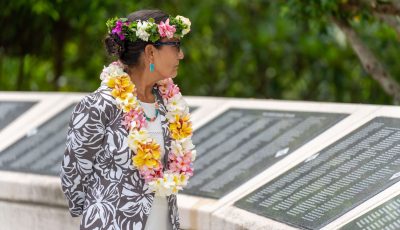DOI hosts forum on US-affiliated nations in Pacific
WASHINGTON—U.S. Interior Assistant Secretary for Insular Areas Doug Domenech hosted several presentations yesterday focused on economic performance, policies, and possibilities for the freely associated states of the Federated States of Micronesia, the Republic of the Marshall Islands, and the Republic of Palau.
“[Yesterday’s] presentations are meant to inform and encourage policy discussions for the U.S. government and the governments of the FSM, the RMI, and Palau,” said Domenech. “We are committed to the partnerships we have under the Compacts of Free Association and to working collaboratively toward enhanced social and economic development for the people now and into the future.”
Highlights from the presentations:
Economic performance was shown to have varied substantially across all three nations within specific sub-periods of the overall period from fiscal years 2003 to 2016. The RMI had the best overall performance over the period despite extraordinary challenges typical of small, remote and fragile island economies. Palau’s performance excelled over the latter portion of the period due to a rapid expansion of tourism.
The Compact Trust Funds for the FSM and RMI were contrasted with that of Palau, with the most profound difference between the funds being the design. The FSM and the RMI’s funds were designed to last in perpetuity as a source of funding support following the expiration of direct grant assistance in 2023, whereas Palau’s fund was designed as a sinking fund to provide budgetary support at a fixed level—thereby declining in real value—only through the 50th year of the Compact relationship. The presentation also highlighted opportunities for the U.S., FSM, and RMI governments to improve rules and ensure smooth transitions from direct grants to trust fund distributions in 2024 with respect to the FSM and the RMI.
A policy scorecard was presented with summary scores for each nation in 19 separate categories of potential reform focus. All three nations scored well in fiscal responsibility factors. On the other hand, all three have had been frustrated in their attempts to reform and modernize their tax policies and tax administration.
Pacific Possible: Potential areas of opportunity presented include tourism and fisheries with access to improved internet access and connectivity accelerating the spread of knowledge and increasing productivity. Non-communicable diseases and climate and disaster resilience were identified as risks to prosperity in the Pacific.
Graduate School USA economists Kevin O’Keefe and Dr. Mark Sturton presented economic and policy perspectives on the Pacific as part of a Graduate School USA Economic Monitoring and Analysis Program contracted through the Department of the Interior’s Office of Insular Affairs.
Other Graduate School USA programs funded by the Technical Assistance Program through OIA include the Island Government Finance Officers Association, the Executive Leadership Development Program, the Association of Pacific Island Public Auditors, and the island governments’ Performeter program.
World Bank program leader Robert Utz presented Pacific Possible, with a focus on potential opportunities in the FSM, RMI, and Palau, exploring both areas of economic viability and potential risks for the next 25 years in the Northern Pacific. (PR)



























